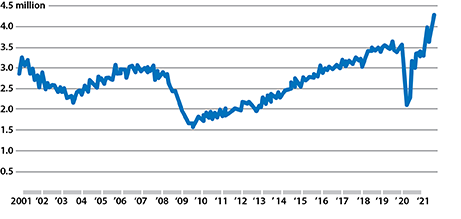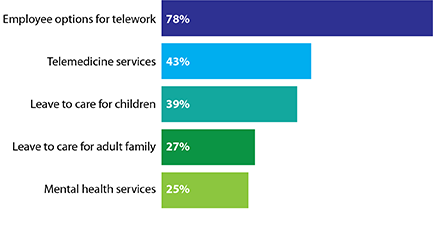
Adapting to Candidates’ New Job Expectations in 2022

Ms. Pomerantz is the CEO of TPG Staffing LLC and has over 35 years’ experience in recruiting top talent for some of the largest companies in the world and start-ups alike. She earned a BS from the University of Pittsburgh and a Master’s in Human Resource Management from Rutgers University. She also has senior HR credentials, including both SPHR and SHRM-SCP certifications.

One consequence of the global COVID-19 pandemic can be seen in many job candidates’ expectations. While it is true that some job candidates have only changed their expectations slightly to moderately, for many others, especially younger employees expectations have sometimes changed quite dramatically. These new job candidates’ expectations apply to both the nature of the work they are seeking and the compensation and benefits they expect to receive for that work. The lingering threat of the pandemic has made individuals reconsider the types of work environments they want to participate in and even the relative importance of joining (or rejoining) the workforce over other commitments such as taking care of family members or continuing education. The experience of shifting to remote work arrangements across a range of industries has also changed the decision-making calculus for many individuals when considering new employment opportunities. These changing expectations have made it essential for employers to develop a compelling employee value proposition that includes competitive compensation and meaningful benefits, especially career development opportunities and flexible work accommodations in their quest to find new talent to fuel their future growth and success.
“The last 20 months have taught employers that you can’t discount how people feel about their jobs, their lives and their families, and how important it is to take care of your employees and their families.”
Greg Muccio, director of talent acquisition at Southwest Airlines [1]
The “Great Resignation” is showing employees quitting at historically high levels and resulting in a reduction of the available labor pool

In addition to changing job candidates’ expectations, the total number of available workers has also decreased due to what many have termed the “Great Resignation.” Faced with a variety of factors connected to the pandemic, many Americans have simply dropped out of the labor market, either retiring earlier than expected or “opting out” of the labor market (perhaps) temporarily to take care of other responsibilities. This phenomenon reinforces the impact that job candidates’ changing expectations have on the recruitment picture, further complicating the search for new talent across a wide range of industries while increasing the likelihood of companies needing to replace workers who have left because of the “Great Resignation.” [2]
Changing job candidates’ expectations require a combination of new and time-tested recruitment approaches
To respond to the challenge of changing expectations among job candidates, companies are adjusting their recruitment strategies to the “new normal” by refocusing on old techniques that are still effective in this new recruitment environment, as well as employing new technologies and tactics. The new tactics often incorporate elements such as flexibility in scheduling and work arrangements, a more holistic approach to employee wellness, and an increased emphasis on career development. Two of the still-effective time-tested methods are adjusting compensation to be more competitive and streamlining the job candidate experience to speed up the time from first contact to onboarding. Technology, in particular, can be very helpful in achieving this streamlining goal.

Start by reviewing employee compensation for competitiveness within your industry
When the U.S. labor market began to rebound from the early pandemic-fueled downturn in the summer of 2020, employers began citing labor shortages as the cause for their increased difficulty in hiring new workers. However, many saw the situation differently, particularly for low-wage workers. Many of these workers had been asked to shoulder new pandemic-related responsibilities and risks, and yet had not seen a significant increase in compensation as a result. Potential entrants (or re-entrants) into the labor market were hesitant to apply to positions where the risks and responsibilities did not seem commensurate with the compensation being offered. According to George Kelly, senior vice president at Milwaukee-based recruiting and staffing firm ManpowerGroup, “Employers are realizing they have to be wage-competitive. Wage growth in the U.S. has been incredibly slow over the last 30-plus years, but since the summer of 2020, wage growth has accelerated, driven by competition.” Many companies have responded by increasing pay for their low-wage workers, with job site ZipRecruiter reporting that the number of job postings that advertise pay of $15 per hour has more than doubled since 2019. [1]

Enhanced benefits can be a key element of improving compensation
Benefits have always been an important part of compensation, but the Covid pandemic has expanded the range of benefits that employees may find critical when evaluating whether to stay in their positions or seek new opportunities. In this new recruitment environment, candidates are placing increased importance on the quality of their health benefits. Other perks such as wellness and family caregiving support, financial planning assistance, on-site childcare, dedicated transportation to and from work, and technological support for remote work have also become critical factors being evaluated by candidates when they are making employment-related decisions.

benefits to their employees [1]
Strengthening professional development can yield dividends
With many individuals weighing the cost/benefit analysis between returning to the workforce during a pandemic against the value of pursuing education and training (often offered online), a number of companies have found that increasing their focus on the professional development of their employees at all levels can offer a tremendous boost to their efforts at retention and recruitment. By enhancing workers’ skills and offering an internal career path, companies have found it much easier to recruit and maintain their workforce, while at the same time gaining improvements in worker morale and productivity as positions that once seemed “dead-end” to many employees become seen as a path to a brighter future. [1]

The perceived value of flexibility has increased enormously
Job seekers at all levels and in all industries have begun to see flexibility as a top priority – in ways that we have never seen before. Since the explosion of remote work opportunities has given people the ability to see new work/life possibilities that they may not have even considered before, many current and prospective employees desire and even expect a level of work flexibility that was not even an option for most employees even a few years ago. This desire for flexibility plays out differently in different industries but can include elements such as remote work options, increased autonomy in decision-making, and – particularly for positions that still require on-site work – flexibility and predictability in scheduling so that workers can manage childcare and caregiving responsibilities. [1]
Streamlining the job candidate experience can make all the difference
In this new recruitment environment, companies are competing for a limited number of job candidates, those companies that are still relying on the traditional complex or slow-moving recruitment process often will lose out on hiring quality candidates to more nimble and agile companies who have streamlined their recruitment processes. During this new recruiting reality companies that continue to use the traditional recruitment process with its built-in requirements of waiting and ensuring “every box has been checked”, and sometimes even with outdated job requirements, will often learn the candidates they were interested in have accepted an offer from their competitor. Some companies in an effort to widen the candidate pool for specific positions have begun to rethink their mandatory degree requirements and how to remove other potential hurdles to employment. Some companies have gone even further and are reviewing possible minor criminal histories or marijuana drug testing that may not truly be critical for specific positions within their company. In addition, simply speeding up the hiring process from start to finish can make all the difference in landing your next qualified candidate. If a potential employee receives an attractive offer from a competitor while your company still hasn’t scheduled an interview (or is glacially moving through the second and third rounds of a complex hiring process), they are not going to sit around and wait. Using technology and sensible streamlining steps in this new recruitment environment can make all the difference in fulfilling job candidates’ expectations and winning the war for talent. [1]
TPG Staffing has decades of experience in the staffing industry. We are here and ready to help you fill any staffing openings from our pool of talented professionals. If you would like to know more about how TPG Staffing can help your company with any recruitment efforts please call us at 732-246-7100.
Sources:
- https://www.shrm.org/hr-today/news/hr-magazine/winter2021/Pages/job-candidates-expectations-have-changed.aspx
- https://www.wsj.com/articles/job-openings-us-growth-labor-market-turnover-02-01-2022-11643670099
- https://www.uschamber.com/workforce/how-one-small-business-is-finding-workers-in-a-tight-job-market